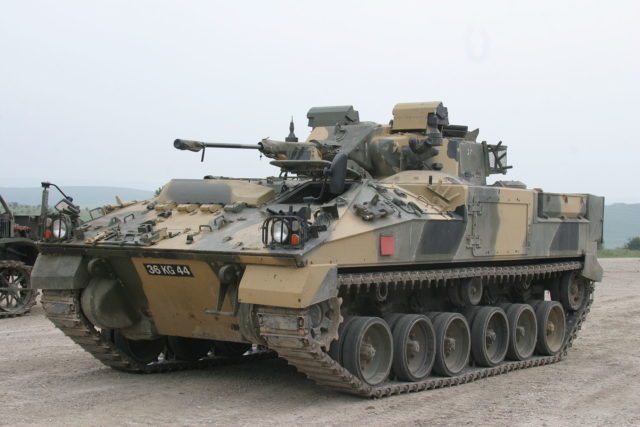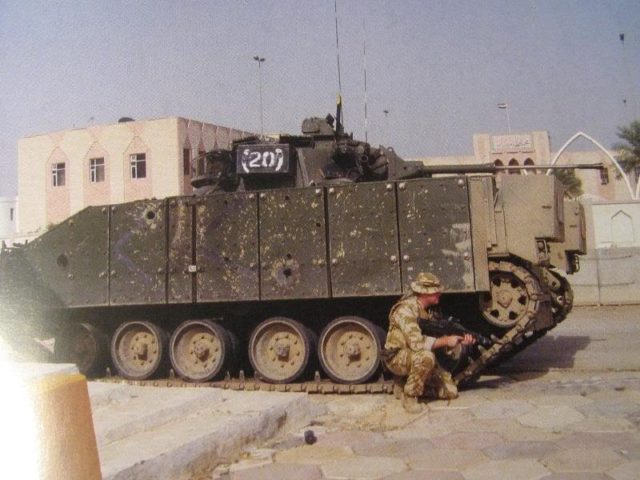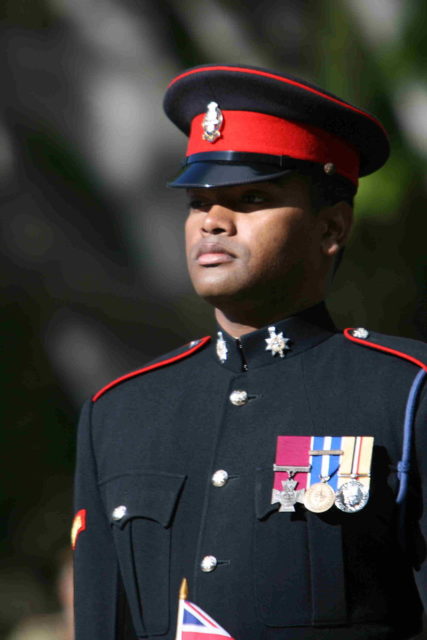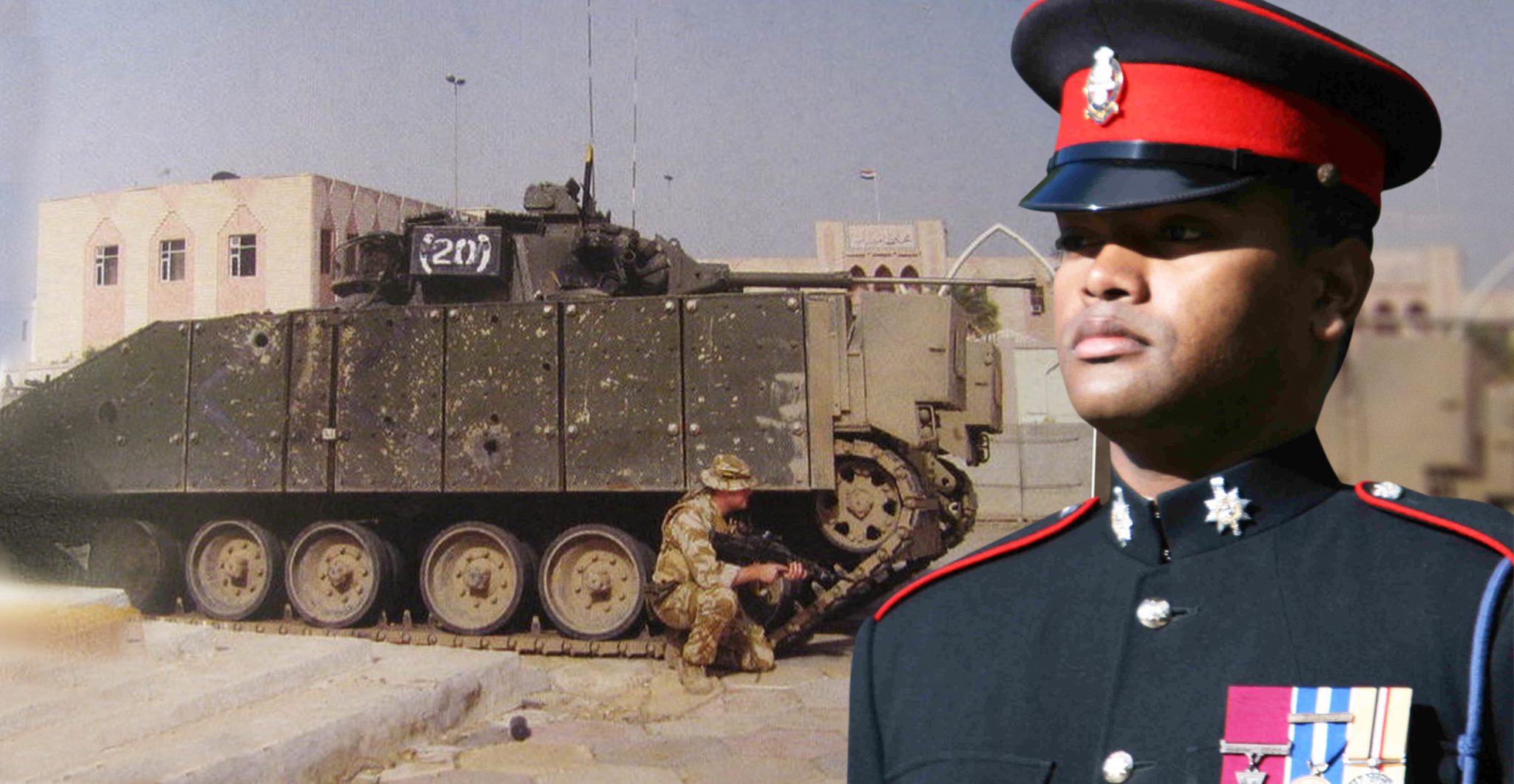In modern history, the war in Iraq which began with the 2003 invasion is surrounded by unique controversy that has yet to be fully settled. However, what is beyond controversy is the gallantry and courage of the average soldier who fought it. Beyond politics, the average warrior in any conflict has always fought for the man beside him and little else.
This would be no different for the only Victoria Cross recipient of the Iraq War, Johnson Beharry. When his convoy of Warrior tracked vehicles were hit with multiple RPGs and small arms fire, his only concern was the welfare of the men with him. Driving through this flurry of enemy fire and with a cabin full of smoke, he opened the hatch and exposed himself to enemy fire in order to get his crew out of the kill zone. As the lead vehicle, he led the entire column through the ambush as the only conscious member of his crew. And not to be outdone, just over a month later this Warrior vehicle driver did it again.
This time taking an injury from an RPG strike just six inches from his head, he was rendered incapacitated. But when he awoke, he would find himself the first and only Victoria Cross recipient of the conflict.
The Road to Heroism
Johnson Beharry was born on July 26th, 1979 in Grenada. Sibling to four brothers and three sisters, his family moved to the United Kingdom in 1999. Shortly after his arrival, he joined the Princess of Wales’s Royal Regiment in 2001. Making his way through training, he would soon find himself a driver of a British Warrior Armoured Vehicle for C Company, 1st Battalion. After short stints in Kosovo and Northern Ireland, the invasion of Iraq in 2003 would lead him to the town of Al Amarah in 2004 and a rendezvous with history.

While the initial invasion of Iraq seemed to go well for coalition forces, by 2004 they found themselves in the midst of a full-blown insurgency. Throughout the country, crowds that once welcomed the deposal of Saddam Hussein had now set their sights on those same forces. As the insurgency began to kick up steam in Iraq, coalition forces found themselves under increasing threat from ambush and the new dreaded improvised explosive devices or IEDs. Within every road driven and every route taken rested the potential for disaster.
Getting Out of the Kill Zone
During the morning of May 1st, 2004, Beharry was the lead driver for his Platoon Commander’s vehicle when they got the call to reinforce an isolated post of coalition forces in the city of Al Amarah. Meanwhile, an isolated foot patrol in the city came under intense fire from small arms, RPGs, and an IED. Tasked with their extraction, Beharry’s column was redirected.
On approach to the beleaguered squad, the platoon noticed an unusual sight in front of them. The roads were clear of all traffic, all cars, and there was not a single civilian in sight. With the clear sign of an ambush ahead, the platoon commander ordered a halt of all vehicles to assess the situation. It was too late; they had already entered the kill zone. At that moment, Beharry’s lead vehicle was hit with multiple RPG strikes. In an instant, the platoon commander and the gunner in Beharry’s Warrior were incapacitated.
With the column taking heavy damage and completely on his own initiative, Beharry closed the driver’s hatch and decided to push through the ambush, freeing the rest of the platoon to follow behind him.

With no idea as to whether the rest of the crew was alive or dead, he continued to push until he hit a barricade placed on the road. At that point, his vehicle was hit again with multiple RPGs filling the cabin with thick smoke. Obligated to open the hatch and expose his head to the heavy rain of small arms fire, he continued to drive the column forward to safety straight through the barrier. At one point, Beharry himself took a 7.62mm bullet directly to the head which became miraculously lodged in his helmet.
Finally making his way to the outpost, he dismounted the vehicle still under heavy small arms fire and began to evacuate his crew. He then remounted his burning vehicle and moved it to a strategic position in order to defend against the enemy. Eventually collapsing from exhaustion, Beharry was done for the day, but not for the war.
One More Ambush
After returning from medical treatment, Beharry was back in action by June. On the 11th of that month, Beharry’s Warrior was called to cut off an enemy mortar team in the middle of the night. Winding his way through the dark city streets, he once again found himself in the one place he didn’t want to be. Another ambush rained down upon him from the rooftops and it was once again up to him to lead his men out of trouble. However, it was at this moment an RPG struck just six inches from his head resulting in a significant head injury. As rockets continued to strike the vehicle, his commander and crew were again out of the fight.
With blood and smoke obscuring his vision, Beharry opted to make a hard reverse and extract from the kill zone. Proceeding at great speed, he only stopped when his vehicle hit a building. At this point, he lost consciousness and his experience in Iraq would come to an end, but the crew would once again be saved. He would spend some time in a coma and under heavy medical treatment, but as word of his actions came to light there would be a great honor to await him. In March of 2005, Johnson Beharry would become the first recipient of the Victoria Cross since the Falklands War and the first living recipient since the Vietnam War.

For Johnson Beharry it would be a long road to recovery and his subsequent time out of the Army was plagued with continued struggles as was the case for many men with his injuries and trauma. However, the history of war can’t help but acknowledge inexplicable gallantry in any scenario and in any war.
Beharry’s actions were in keeping with the finest traditions and history of those who would earn the commonwealth’s highest military honor.
